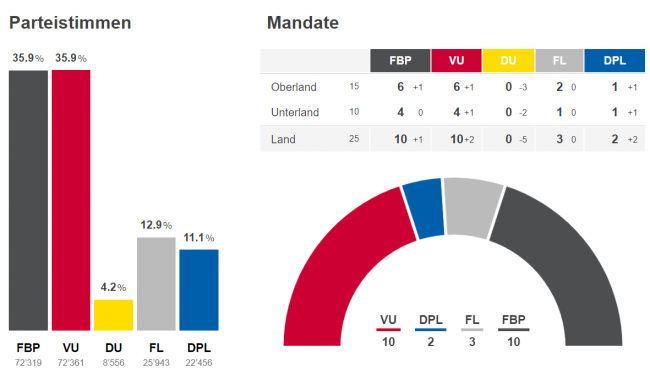Friday, February 12, 2021
On February 7, Liechtenstein held parliamentary elections. Never before in Liechtenstein's history have the election results been so close. Liechtenstein's two largest parties, the FBP (Fortschrittliche Bürgerpartei - Progressive Citizens Party) and the Vaterländische Union (VU - Patriotic Union), won 10 seats each out of the 25 parliamentary seats available. The Head of Government position traditionally goes to the winning party. In the past, this was reflected in the number of parliamentary seats won, but given the tie in seats the VU has declared victory by its total number of votes, having won by a razor-thin margin of 42 party votes. (see explanations about the election system below).

Chart translations: Parteistimmen = Party Votes; Mandate = Mandates; Oberland = Upper Country; Unterland = Lower Country; Land = Country; Party Affiliations: FBP = Progressive Citizens Party; VU = Patriotic Union; DU = The Independents; FL = Free List; DPL = Democrats for Liechtenstein
The VU nominated Daniel Risch for the office of Head of Government. He is a business information scientist and is currently Deputy Prime Minister and Minister of Infrastructure, Economy and Sports. For the FBP, a woman, Sabine Monauni, ran for the post of Head of Government for the first time. Monauni is a lawyer and is Liechtenstein's current Ambassador to the EU in Brussels. The VU and the FBP will now hold coalition talks with the goal to propose a government team to the Parliament at its opening session on March 25.
The liberal opposition party “Die Unabhängigen” (DU - The Independents) did not manage to cross the 8% threshold to make it into the Parliament with 4.2% of the vote. A new party “Demokraten pro Liechtenstein” (DPL - Democrats for Liechtenstein) received 11.1% of the vote and now has two members of Parliament. The left-green “Freie Liste” (FL - Free List) received 12.9% of the party votes, winning three seats in Parliament. Voter turnout was at 78%, 97.3% voted by postal ballot.
The elections can be considered a great success for women in Liechtenstein politics. After only three female candidates won seats in the 2017 parliamentary elections, seven women from three parties will take a seat in the Parliament in the coming legislative period. Also, we expect women to be in the majority in the five-member government team for the first time in Liechtenstein's electoral history.
Preliminary results of an online election survey conducted by the think-tank Liechtenstein Institut show that the government team and, in particular, the two leading candidates were a central motive for voting decisions. The survey also revealed that the candidates' competence was considered more important than party affiliation. 35% of the 1,975 survey participants cited the government team as the main reason for voting for a particular party. Only 8% named party affiliation as their main reason. By comparison: In the 2001 parliamentary elections, traditional party affiliation was still the most important reason for voting for a party (34%). Both Daniel Risch and Sabine Monauni have very strong support among their own voters. If direct elections had been possible, 47% of all survey participants would have voted for Sabine Monauni and 39% for Daniel Risch. Voters from the smaller parties in particular would have been more likely to support Sabine Monauni than Daniel Risch.
Detailed results and information on candidates can be found on www.landtagswahlen.li. The full results of the election survey are expected to be published at the end of March and can be found on the webpage of the Liechtenstein Institut.
Parliamentary Elections in Liechtenstein
In parliamentary elections, Liechtensteiners cast two set of votes. Votes are cast for parties, and votes are cast for particular candidates. Depending on where one lives, each voter has 10 (Lower Country) party votes, or 15 (Upper Country) party votes. In addition, each voter can cast their respective 10 or 15 votes for various members of Parliament. The composition of seats in the Parliament is decided by the party votes, and depending on how many seats a party gets, the candidates with the most votes get a seat in the Parliament. 15 members of Parliament are from the Upper Country, 10 from the Lower Country.
In a coalition Government (Cabinet of Ministers), out of the five ministerial positions available, the majority party is allocated three seats, while the minority partners occupy two seats. The Parliament appoints the Government in its inaugural meeting. Even though Government members are not elected directly, the two biggest parties campaign with a three-person Government team.
Liechtenstein's Political System
The Parliament of the Principality of Liechtenstein (Landtag) consists of 25 members. The President and Vice-President of Parliament are elected at the opening session for the legislative period. The five-member Government constitutes the executive branch of parliament. It consists of the Head of Government and four Ministers. Since 2013, the Government has been organized into five ministries (Presidential Affairs and Finance, Foreign Affairs, Social Affairs, Interior and Infrastructure). Further areas of economy, justice, education, environment, sports and culture are assigned to the individual ministries. Each member of the Government is head of a ministry and bears the title of Minister/Ministerin (“Regierungsrat/Regierungsrätin”).
Liechtenstein's two largest parties, the VU (Vaterländische Union - Patriotic Union) and FBP (Fortschrittliche Bürgerpartei - Progressive Citizens Party), and three smaller parties FL (Freie Liste - Free List), DU (Die Unabhängigen - The Independents) and DPL (Demokraten pro Liechtenstein - Democrats for Liechtenstein) competed for the 25 seats in Parliament in 2021. The FL has become an integral part of the political landscape since its beginnings (1985), entering Parliament for the first time in 1993. DU ran as a splinter party of the VU for the first time in 2013 and won four seats right away. DPL, founded in September 2018, emerged from a split from the DU.
